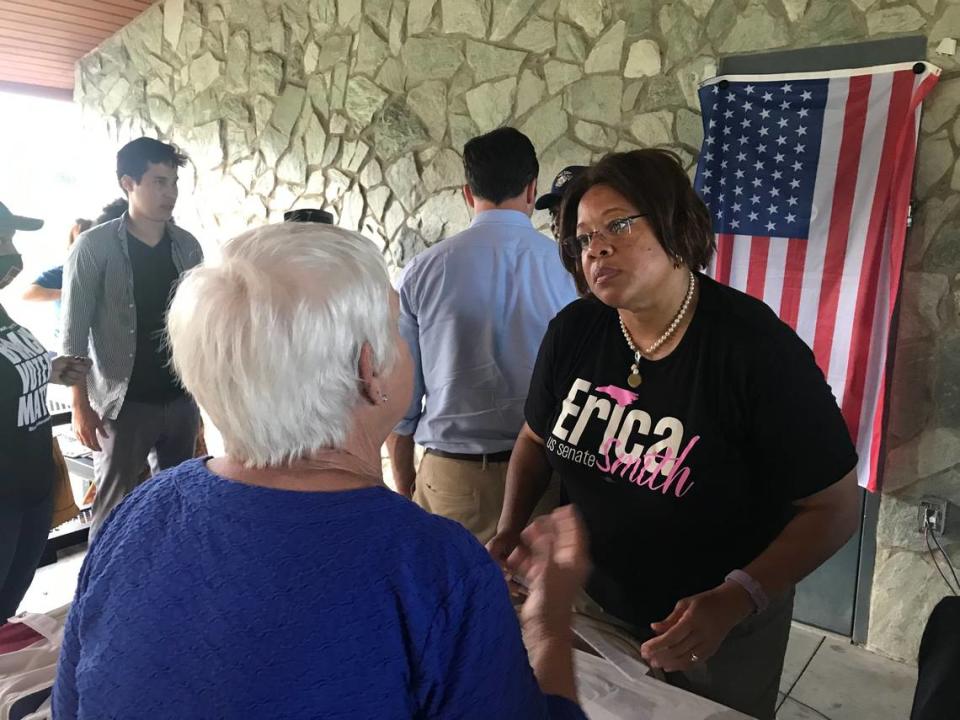NC Democrats running for Senate show differences on filibuster, policing, health care
- Oops!Something went wrong.Please try again later.
- Oops!Something went wrong.Please try again later.
Three Democrats vying for their party’s nomination in next year’s U.S. Senate race in North Carolina gave voters different visions Monday for how they would pursue key legislative priorities like an overhaul of policing and universal health care.
State Sen. Jeff Jackson, former state Sen. Erica Smith and Dr. Richard Watkins, a virologist, participated in a candidate forum organized by Indivisible Triangle, a local liberal advocacy group, at Womble Park in Holly Springs. Jonah Kaplan, a political and investigative reporter at ABC11, was the moderator.
Two other candidates, former North Carolina Chief Justice Cheri Beasley and Beaufort Mayor Rett Newton, did not attend. (Beasley’s campaign said she had a prior commitment while Newton’s campaign said he was not invited).
The forum offered the candidates an early opportunity in the monthslong campaign to set themselves apart on issues of high importance to Democratic voters. At the top of the list was the future of the Senate filibuster, which has become the focus of an intense dispute among Senate Democrats, many of whom have said it’s time to waive the 60-vote threshold for ending debate on legislation in favor of a simple majority of 51 votes.
All three candidates voiced their opposition to the current incarnation of the filibuster, agreeing that the procedural hurdle was stymieing too many essential components of Democrats’ legislative agenda, particularly their flagship voting rights bill that has stalled in the Senate. But they appeared to disagree on how Democrats should proceed to replace the current minimum vote requirement.
“I think the day of the 60-vote filibuster has come and gone, ladies and gentlemen,” Jackson, a Mecklenburg County Democrat who entered the race in January, said to cheers from the audience of voters and activists. “I don’t think it’s been used as a tool to facilitate bipartisanship, I think it has been used as a tool to facilitate gridlock, and I have no idea what Joe Manchin is thinking, that caving to Mitch McConnell is in any way acceptable, especially when it comes to voting rights legislation.”
Asked by Kaplan if he would support a total elimination of the filibuster, Jackson said the 60-vote threshold “needs to go,” but appeared to endorse the talking filibuster, a compromise that has garnered the support of President Joe Biden, and seemingly, West Virginia Sen. Joe Manchin.
“If someone wants to take the floor and speak, go ahead, Mr. Smith, give a speech,” Jackson said, referencing the 1939 film “Mr. Smith Goes to Washington.”

Smith, the former North Carolina lawmaker who ran unsuccessfully for the Democratic nomination for U.S. Senate last year, expressed less tolerance for continuing the filibuster in any capacity, saying that too many legislative priorities hang in the balance.
“Throughout our history the filibuster has been used as a tool, a relic of Jim Crow segregation,” Smith said, repeating a claim her campaign has featured in fundraising emails. “It has been used as a weapon to deny voting rights, to deny LGBTQ rights, to deny women’s rights.”
“You either end the filibuster, abolish the filibuster, or you abolish democracy as we know it,” she said.
Delay tactics using long speeches date back to the beginning of the Senate in the 18th century, the Senate website notes. In the 20th century, Southern Democrats used the filibuster to block civil rights and anti-lynching legislation.
Watkins also said the Senate should “get rid of the filibuster,” arguing that the concerns of some Democrats who say that a lower vote threshold would open the door to a wish list of GOP priorities if Republicans regain the majority, proves that the desire to eliminate the filibuster and reap the legislative rewards is actually bipartisan.
“The filibuster just holds up democracy, holds up progress,” Watkins said.
The future of policing
The nationwide push by advocates to re-imagine policing in light of the murder of George Floyd last May was another issue where the candidates appeared to be in agreement at a broad level, but expressed different views on how police departments should be changed.
Smith, who ran unsuccessfully for the Democratic nomination for U.S. Senate last year, drew on the experiences of her own family to illustrate what she said was the urgent need for police reform. Smith, who is African American, said she prays for the safety of her four sons whenever they’re on the road out of fear “that they will not survive a routine traffic stop.”
In addition to expressing support for the George Floyd Justice in Policing Act, legislation that Democrats say would increase accountability for police misconduct, Smith suggested that local law enforcement throughout the country needs to be scrutinized more closely.
“Our police departments across this nation have been infiltrated by supremacists and domestic terrorists,” Smith said to applause. “We need a screening process and a training process so that mostly unarmed Black men are not killed and shot down by the people who are meant to protect them.”

Asked about the dangers faced by police officers amid an increase in the number of cops who have died while on the job, Smith said police officers “put their lives on the line every day” and “must be kept safe.” The solution, she said, is to direct cops to incidents where they are most needed, and to re-think what first responders might look like for nonviolent situations like a traffic stop, or someone in need of mental health attention.
Jackson said the U.S. Senate should pass the Democrats’ policing bill immediately, adding that inaction on the issue isn’t an option.
Asked if he agreed with calls by advocates and certain Democrats to “defund the police,” Jackson answered with an emphatic “no.”
“You don’t raise standards for law enforcement by lowering pay. You want better law enforcement, you’re not going to get there by defunding the police,” Jackson said.
On the issue of crime in major cities, which a recent Washington Post-ABC News poll found 59% of Americans believed is a serious problem throughout the country, Watkins said the problem was a lack of opportunities and resources in low-income neighborhoods that need economic empowerment.
He also pointed to what he said was an incomplete narrative about crime in the media and public discourse.
“People just want to tell half the story, like it’s just handguns and inner-city violence, or Black-on-Black crime, come on. It’s all about poverty,” he said. “You address poverty, you give people resources, you properly fund public education, you properly fund and research mental health, I guarantee you gun violence will go down.”
Universal health care
The candidates were asked about a variety of issues including military spending, the planned troop withdrawal from Afghanistan, student loan debt, who should set the curriculum for schools, and the ongoing debate among Democrats over health care.
On health care, Jackson told the audience, some of whom were members of a group advocating for Medicare for All, that he respects their long-term vision for single-payer health care but is skeptical of the bill’s ability to pass the Senate.
“The way I approach politics, and this goes for this issue and a whole host of others, just a little insight into how I think: I want the boldest possible version of reality,” he said. “I want the boldest possible version of what we can get.”
In the meantime, Jackson said, it’s critical the U.S. is on a path to universal health care by 2024, “because we don’t know who’s going to be president in 2025, dear God.” The way to do that is to lower the eligibility age for Medicare to 60 from 65, and to allow anyone to opt into the federal program, he said.
Smith pushed back on the notion that Medicare for All is too costly or unrealistic.
“No one ever asks how do we afford the trillions of dollars that we invest into war in this nation. No one ever asks the question, ‘how do we pay for a bailout of corporations?’ No one ever asks how do we pay for a bailout of Wall Street,” she said. “So if we don’t ask how do we pay for those programs, then we know that we can pay for Medicare for All.”
Smith said her family nearly went bankrupt when one of her sons was born prematurely at five months, and that she had to work as a part-time educator at an alternative school to pay for the “life-saving health care he needed” that added an expense of $368 per month.
“I support Medicare for All, not four years from now, not long-term 10 years from now, I want Medicare for All for all Americans,” she said.
For more North Carolina government and politics news, listen to the Under the Dome politics podcast from The News & Observer and the NC Insider. You can find it at link.chtbl.com/underthedomenc or wherever you get your podcasts.
Under the Dome
On The News & Observer's Under the Dome podcast, we’re unpacking legislation and issues that matter, keeping you updated on what’s happening in North Carolina politics twice a week on Monday and Friday mornings. Check us out here and sign up for our weekly Under the Dome newsletter for more political news.

